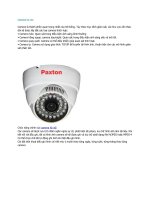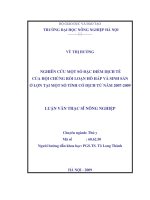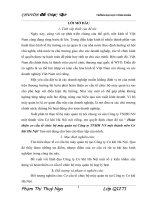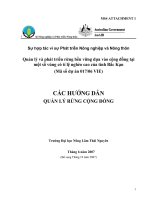Quan sát ở bước sóng millimet một thiên hà có dịch chuyển đỏ cao dựa trên hiệu ứng thấu kính hấp dẫn
Bạn đang xem bản rút gọn của tài liệu. Xem và tải ngay bản đầy đủ của tài liệu tại đây (124.9 KB, 2 trang )
THÔNG TIN TÓM TẮT VỀ NHỮNG KẾT LUẬN MỚI
CỦA LUẬN ÁN TIẾN SĨ
Tên đề tài: Quan sát ở bước sóng millimet một thiên hà có dịch chuyển đỏ
cao dựa trên hiệu ứng thấu kính hấp dẫn
Chuyên ngành: Vật lý Nguyên tử Mã số: 62 44 01 06
Nghiên cứu sinh: Phạm Tuấn Anh
Người hướng dẫn: GS. Pierre Darriulat & TS. Frédéric Boone
Cơ sở đào tạo:
Viện Vật lý-Viện hàn Lâm Khoa học và Công nghệ Việt Nam
Luận văn trình bày chi tiết về quan sát một thiên hà chứa quasar RX
J0911 dựa trên vạch phổ quay của phân tử CO được đo bởi hệ thống kính giao
thoa thiên văn Plateau de Bure (PdBI). Quan sát này được thực hiện nhờ hiệu
ứng thấu kính hấp dẫn mạnh bởi một thiên hà khác nằm chắn phía trước. Hệ
giao thoa này có độ phân giải cao cả về tần số, giúp đo độ rộng vạch phổ chính
xác và về không gian, giúp phân giải kích thước ngu
ồn phát phổ vạch và phổ
liên tục tương ứng với thành phần khí và thành phần bụi của thiên hà.
Những đóng góp mới, kết luận mới của luận án là:
Chúng tôi lần đầu tiên xác định được kích thước đám mây phân tử khí
106±15 và bụi 39±18 mas của thiên hà chứa quasar RX J0911.
Chúng tôi đánh giá được sai số hệ thống trên kết quả đo ở trên bằng cách
sử dụng các mô hình thấu kính hấp dẫn khác nhau, các phân bố
độ sáng
nguồn khác nhau. Chỉ ra rằng đối với các nguồn gần đường tới hạn (trên
mặt phẳng nguồn) thì các mô hình khác nhau cho hệ số khuếch đại khác
nhau bởi hệ số 2.
Chỉ ra hệ số khuếch đại khác nhau cho nguồn điểm, đám mây khí và bụi.
Đám mây khí không phải dạng tròn mà dạng elip, tìm ra bằng chứng về sự
thay đổi vận tốc (velocity gradient) ở mức 4.5 độ lệ
ch chuẩn.
Thiên hà này có thể đã tiêu thụ phần lớn đám mây khí của mình sau một
quá trình hình thành sao dữ dội và giờ nó nằm ở biên giới giữa các thiên
hà có độ dịch chuyển đỏ cao và thấp.
Nghiên cứu sinh
SHORT SUMMARY OF THE PHD THESIS
Title: Millimeter observation of a gravitationally lensed high redshift galaxy
Speciality: Atomic Physics Code: 62 44 01 06
Student: Phạm Tuấn Anh
Supervisor: Prof. Pierre Darriulat
Institution: Institute of Physics, Vietnam Academy of Science and Technology
The thesis gives a detailed account of observations of the host galaxy of a
distant quasar, RX J0911. Detailed observations of the CO emission have been
made possible thanks to the gravitational lensing offered by the presence of a
galaxy in the foreground and to the quality of the Plateau de Bure
Interferometer. High resolutions have been obtained both in frequency, allowing
for a precise measurement of the line width, and in space, allowing for resolving
spatially the source both on the line and in the continuum, namely both in its
dust and gas content. The mechanism of gravitational lensing has been discussed
in detail. As is often the case with large magnifications, the source happens to be
in the vicinity of the lens caustic, in fact to overlap it. A consequence is a strong
dependence of the magnification on the precise position of point sources in the
galaxy, resulting in significantly different magnifications for the gas, the dust
and the central QSO. Moreover, the morphology of the observed images is
distorted in addition to being amplified. The data illustrate the advantage offered
by the strong lensing in terms of increased sensitivity as well as the
complication that results, causing an additional source of uncertainties on the
quantities that are accessible to measurement. The CO(7-6) line stands out
clearly above continuum, allowing for reliable measurements of the gas and dust
luminosities. Detailed studies of the four lensed images have made it possible to
resolve the source in both the line and the continuum with rms radii of 106±15
and 39±18 mas respectively. In the line case, the quality of the data have
provided evidence for an ellipticity of the source, 3.3 standard deviations away
from circular, and for a velocity gradient correlated with the source ellipticity, at
the level of 4.5 standard deviations. The very narrow CO(7-6) line implies a low
dynamical mass and both gas and dust mass evaluations fall on the low side of
the normal high-z quasar host population. The large star formation efficiency is
on the high side of both low-z and high-z galaxies: much of the gas has been
exhausted after an intense star formation period, leaving the galaxy at the border
between high-z and low-z quasar hosts.
Phd student









